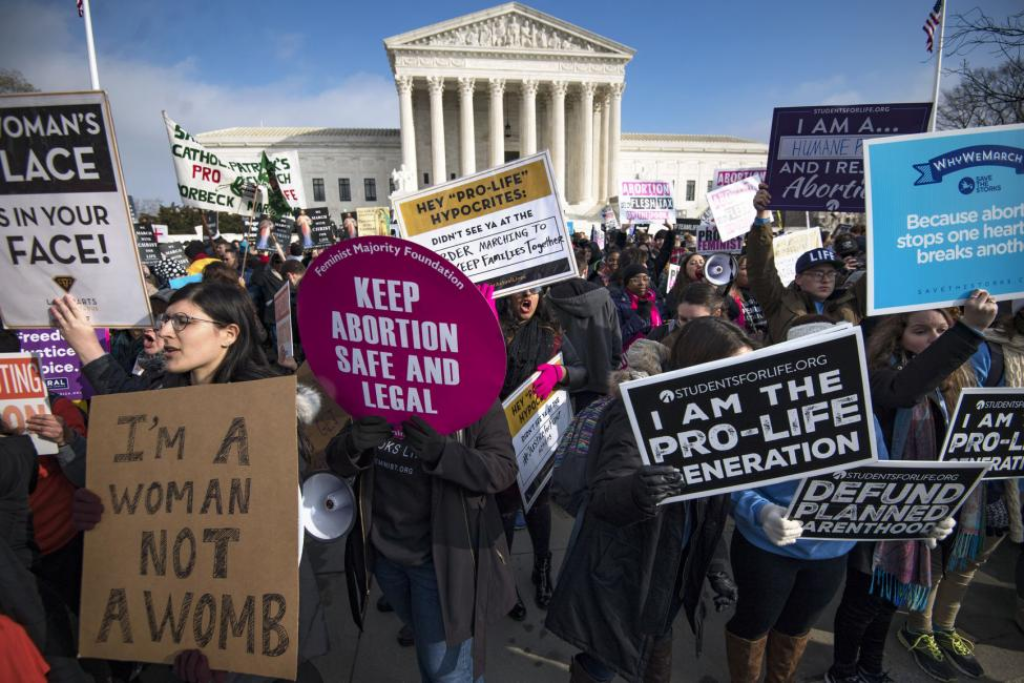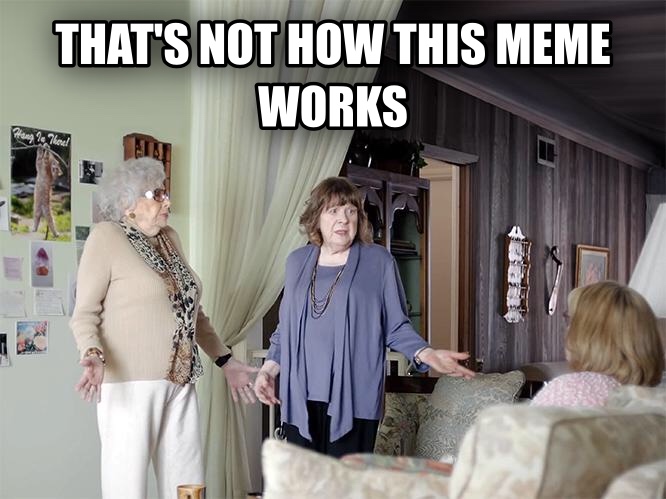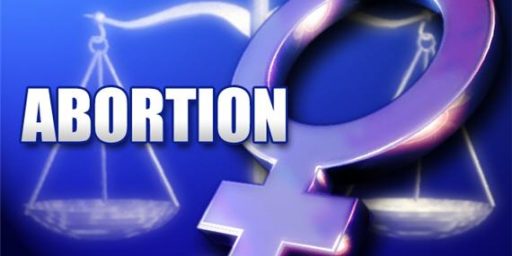Trial Court Judge Ignores SCOTUS Abortion Ruling

POLITICO (“Federal judge says constitutional right to abortion may still exist, despite Dobbs“):
A federal judge in Washington, D.C., suggested Monday that there may be a constitutional right to abortion baked into the 13th Amendment — an area she said went unexplored by the Supreme Court in its momentous decision last year overturning Roe v. Wade.
In a pending criminal case against several anti-abortion activists, U.S. District Court Judge Colleen Kollar-Kotelly said the Supreme Court’s ruling in Dobbs v. Jackson Women’s Health Organization concluded only that the 14th Amendment included no right to abortion but stopped short of definitively ruling out other aspects of the Constitution that might apply.
“[I]t is entirely possible that the Court might have held in Dobbs that some other provision of the Constitution provided a right to access reproductive services had that issue been raised,” the judge wrote. “However, it was not raised.”
Kollar-Kotelly noted that there is some legal scholarship suggesting that the 13th Amendment — which was ratified at the end of the Civil War and sought to ban slavery and “involuntary servitude” — provides just such a right. She is asking the parties in the criminal case, which involves charges of blocking access to abortion clinics, to present arguments by mid-March.
In particular, the judge is asking them to address ”whether the scope of Dobbs is in fact confined to the Fourteenth Amendment” and “whether, if so, any other provision of the Constitution could confer a right to abortion as an original matter … such that Dobbs may or may not be the final pronouncement on the issue, leaving an open question.”
Kollar-Kotelly’s ruling here is, frankly, moronic.
I have no interest in re-litigating Dobbs‘s Constitutional merits or political wisdom here. I maintain my very longstanding belief that 1) Roe was wrongly decided; that 2) Casey amended Roe to craft what I happen to think was solid public policy; and 3) Dobbs unwisely overturned half a century of precedent with all manner of bad results.
That said, the ruling could not have been more clear:
The Constitution does not confer a right to abortion; Roe and Casey are overruled; and the authority to regulate abortion is returned to the people and their elected representatives.
That is in no way “confined to the Fourteenth Amendment.” If the opening clause didn’t make that clear—and, I stress again, it absolutely fucking did—certainly (a)(1) makes it crystal clear:
First, the Court reviews the standard that the Court’s cases have used to determine whether the Fourteenth Amendment’s reference to “liberty” protects a particular right. The Constitution makes
no express reference to a right to obtain an abortion, but several constitutional provisions have been offered as potential homes for an implicit constitutional right. Roe held that the abortion right is part of a right to privacy that springs from the First, Fourth, Fifth, Ninth, and Fourteenth Amendments. See 410 U. S., at 152–153. The Casey Court grounded its decision solely on the theory that the right to obtain an abortion is part of the “liberty” protected by the Fourteenth Amendment’s Due Process Clause. Others have suggested that support can be found in the Fourteenth Amendment’s Equal Protection Clause, but that theory is squarely foreclosed by the Court’s precedents, which establish that a State’s regulation of abortion is not a sex-based classification and is thus not subject to the heightened scrutiny that applies to such classifications.
So, rather clearly, the controlling decision in Dobbs rejects the idea that there is an abortion right anywhere in the Constitution, let alone in the 1st, 4th, 5th, 9th, or 14th Amendments.
Now, it’s true that the Court didn’t specifically consider whether the 13th Amendment, which states—in its entirety
Section 1.
Neither slavery nor involuntary servitude, except as a punishment for crime whereof the party shall have been duly convicted, shall exist within the United States, or any place subject to their jurisdiction.Section 2.
Congress shall have power to enforce this article by appropriate legislation.
protects abortion. Mostly likely, this is because 1) it’s an absurd argument and 2) none of the litigants in any abortion case that has ever made it to the Supreme Court, including the one at hand, raised it (probably on account of its being absurd).
But here’s the thing: the Supreme Court of the United States, who gets to decide on a rolling basis what the Constitution says, explicitly ruled “The Constitution does not confer a right to abortion” and that, therefore, “the authority to regulate abortion is returned to the people and their elected representatives.”
It is beyond bizarre for a mere District Court judge to not only ignore the plain language of the ruling but to actually invite the litigants in a case before her bench to come back to her with an argument they did not previously make.

Interestingly, Kollar-Kotelly, who turns 80 in April, doesn’t display a history as a partisan hack. She was appointed to her present post by Bill Clinton in 1997 but had previously been appointed to the DC Superior Court by Ronald Reagan in 1984. She clerked for a judge on DC’s highest court who was appointed by Lyndon Johnson and served in Richard Nixon’s Justice Department. A quick scan of her “notable cases” shows no obvious prior pattern of weirdness.
But, damn, this one takes the cake. Whatever one’s opinion of Dobbs, we can’t simply have lower court judges—whose job is to clear cases by following precedent—simply ignore the rulings of higher courts. To the extent the status quo is going to be challenged, it has to happen in the Circuits and SCOTUS itself.




Given that there is a lengthy, recent history of conservative district court judges ignoring earlier SC rulings, why shouldn’t a liberal judge take a swing as well?
With all due respect, James, she isn’t moronic. You are ignorant of how court precedent works.
The issue before SCOTUS was Roe and that is what the arguments were based on. The only controlling law that could come out relate to issues actually raised. Everything else is dicta. Dobbs did not address the possible argument under the 13th so it isn’t implicated.*
That said, I don’t think it will work but it is not covered by Dobbs.
@Sleeping Dog: You’d have to give more concrete examples. With specific regard to abortion in the post-Casey, pre-Dobbs, era, what I mostly saw was judges allowing state AGs latitude to take absurdly broad latitude with the obvious loopholes in Casey’s “undue burden” standard. But SCOTUS practically invited them to do that.
Also known as a tactic regularly and frequently taken by Republican judges for years, one that continues at every level. Despite that, I agree with you. But I disagree with you that Roe was wrongly decided. I frequently see this from conservatives, but I don’t know that I’ve ever seen more than hand waving as to the specific reasons. It seems to me that Roe was a logical extension and if you feel it was incorrectly ruled you would also have to say the same about rulings on birth control, the types of sex married couples are allowed to have, whether gay sex can be legislated as a crime, etc.
And finally, I can’t think of anything more “involuntary servitude” than forcing a woman to bear and deliver a child she doesn’t want and then holding her legally responsible for that child. Calling this argument “absurd” is, well, absurd.
The abortion issue and the current Supreme Court is demonstrably absurd. However, truth be told, it’s also absurd to think that a women who is forced to remain in a state of pregnancy is not the subject of involuntary servitude.
Stanford Law Review Article on 13th & Abortion from August 2022
Columbia Law Review article from 2012 (and a 1990 article from that same professor.
1994 article from a Michigan law journal
Took just a few second google search. This theory isn’t new to the judge and isn’t out of nowhere.
Just because you don’t understand something doesn’t make it moronic or absurd.
Lower court judges should have simply shut up and agreed with SCOTUS’s evil and plainly wrong Dred Scott ruling declaring blacks subhuman? Lower court judges take an oath to the Constitution, too, and egregiously bf rulings invite challenge.
SCOTUS has invited this kind of pushback by running off the rails with increasingly radical, extreme, anti-democratic rulings.
Alito wrote in Dobbs that abortion is not rooted in American history and tradition, which is just not true, in addition to the other false statements and errors of logic throughout his decision. I don’t think lower court judges should shy from challenging SCOTUS’s right wing fake facts.
The onus is on SCOTUS to regroup and start grounding its rulings in sound reasoning, not in ideological Federalist Society falderal. Then they will find the public — and lower courts — more willing to begrudgingly accept their pronouncements.
The Constitution is a secular document. Saying abortion isn’t covered by the Constitution is like saying high-blood pressure meds aren’t covered by the Constitution. If a religion wants to say high-blood pressure meds are bad, they are welcome to do so. If doctors don’t want to prescribe you them, they are welcome to do so.
Using the 14th Amendment to guarantee abortion is far more credible than saying medical procedures aren’t part of the private lives of citizens. The only reason we are talking about this is because the zealots who hate women and women having sex, and think the punitive measures are necessary.
So I take it she is not a brilliant legal mind?
@Chris:
Consent of the governed is still a thing. We will see more and more pushback against this court by lower courts and by the American people, because this is a radical right wing court lacking democratic legitimacy. That is the fault of Republicans, and their win-at-all-costs power games that created an extremist (and dishonest) court set against the will of the people.
Ye reap what ye sow.
One thing we’ve learned about the judiciary in the last few years is that any individual judge can legally justify anything they believe. It is increasing apparent that the opinion comes first and then the arguments are written to support it. Just look at the cases the SC chooses. Anyone believe they are randomly chosen or chosen because the SC justices enjoy an interesting case that challenges their intellect? No, not at all. Why else is the SC filled with brilliant legal minds (see Supreme Court Clerks and Undergraduate Elitism) largely separated from the real world?
Look, it’s all well and good that you’re able to approach this from a position of never having your rights or bodily autonomy question or inconvenienced in the slightest. But you’ve had us screaming at you for long enough to maybe ask whether or not your longstanding beliefs are stupid and based solely on the fact that people in power tend to look exactly like you.
@James Joyner:
I wasn’t referring to just Roe and abortion, but a greater range of cases. Examples abound with Texas Fed Dist that have ignored existing precedent. This maybe an attempt to tee up a SC case to overturn the precedent, but it is still ignoring it, which a district court judge shouldn’t do.
If I wasn’t an agnostic I would say I just got points with God for not responding to an unproductive assertion by making an unproductive and sarcastic assertion, and perhaps taking this discussion off the rails. By the time I’m 100 I’ll finally have this whole “social human” thing down pat.
You say you don’t like Dobbs because it’s bad policy. I happen to agree.
Thing is, IANAL, but it also seems to be bad law. Very bad law. That decision has a bunch of very combative handwaving. It says something to the effect of “well, this is different than birth control and you know very well why.” But it doesn’t say why. And that’s because Alito was trying to pick his way through a legal mine field. He chose the decision he wanted, and then wrote the opinion to support it. And the legal reasoning is terrible.
So, policymakers get to address policy (and we’ve seen some legislation as a reaction), and judges deal with law. If you think it’s bad law, you address it via law, not via policy – via some of the questions that Dobbs did not resolve. Via religious freedom, via involuntary servitude.
By the by, I think the principle, which was developed in the 110 years after the 14th Amendment passed into law, that substantive due process means the Government has to have at least a rational basis for the laws it enacts which restrict activity of its citizens, is a pretty good principle, and a pretty good stance, and can be applied to abortion meaningfully, but you think it was bad law. However, you’ve never dived into that. I’m curious, to say the least.
@SKI:
There is simply no definition by which the first clause of the first sentence of the Court’s holding is “dicta.” I don’t love the style of Alita’s opinion but he simply could not have been more clear on this matter.
@Jay L Gischer: Even the Roe court acknowledged a legitimate and important state interest in preserving the life of the unborn child. They just made up a trimester framework which Casey later transmogrified into a more manageable fetal viability standard.
@James Joyner: If I understand correctly, SKI is saying that whatever Alito says about the rest of the constitution in that statement, he doesn’t address anything other than the Roe issues. Simply waving hands and saying “…and there’s nothing in the rest of the constitution either, and the reasons why are left as an excercise for the student”, does not cut it.
@Jay L Gischer:
Exactly.
And, of course, there was no such basis in Dobbs. Rather, Dobbs turns this on its head: “You have no rights, unless the government tells you so.”
This is brazen legal vandalism in order to achieve a desired political outcome.
I think it’s pretty funny that Kollar-Kotelly basically said “Hold my beer.”
Unserious actions provoke unserious responses.
@James Joyner:
Oh, there is no question he meant what he said but it related to an issue that wasn’t before the Court. The Court cannot decide issues not in front of it. Statements in an opinion on an issue they didn’t have in front of them are influential and point to their current thinking, but they are NOT controlling precedent.
Now, I assure you given the results-oriented decision-making of the current majority that they don’t give a damn about consistency of legal theories or facts and the 13th Amendment argument wouldn’t have a chance in front of the current Court but that does not mean that Dobbs itself foreclosed the argument or that the argument is moronic or absurd.
@James Joyner:
This is Republican Federal Court judges ignoring precedent:
https://slate.com/news-and-politics/2022/10/republican-trump-federal-judges-defy-precedent.html
Also:
https://slate.com/news-and-politics/2023/02/abortion-pill-outlawed-single-judge-real-possibility.html
Assumes fact not in evidence.
Characterizing a fetus as an “unborn child” is an opinion, not a fact. There exist religions that have a different opinion.
@charon:
“The Unborn” has always sounded to me like the title of a horror movie.
@charon: after the 35th Trimester, I would feel uncomfortable referring to the unborn child as merely a fetus. Something has gone very wrong, and we need to get that kid born soon, and into school where he belongs.
@charon: The Roe court declared in its Holdings, “State criminal abortion laws, like those involved here, that except from criminality only a life-saving procedure on the mother’s behalf without regard to the stage of her pregnancy and other interests involved violate the Due Process Clause of the Fourteenth Amendment, which protects against state action the right to privacy, including a woman’s qualified right to terminate her pregnancy. Though the State cannot override that right, it has legitimate interests in protecting both the pregnant woman’s health and the potentiality of human life, each of which interests grows and reaches a ‘compelling’ point at various stages of the woman’s approach to term.” Until Dobbs, the fight was over 1) when is that “compelling” point and (after Casey) 2) what constituted an undue burden on the mother’s right?
I know of no US state or any civilized country that doesn’t have some protections for the safety of the fetus at some point in the pregnancy.
@drj:
U. S. Constitution – The enumeration in the Constitution, of certain rights, shall not be construed to deny or disparage others retained by the people.
Sam Alito – Yes it will.
(”Hold my beer.” would be funnier, but you already used it.)
@charon:
Even better: keep religion (any religion) entirely out of this.
@Gustopher: From the birthing room to the fifth grade!
@gVOR08:
Serious rebellions were started with less justification.
But James can’t see this because this issue doesn’t affect him personally.
Alternately, the lower court is respecting the Supreme Court’s precedent on ignoring precedents.
The Supreme Court has a crisis of legitimacy. Its rulings are haphazard and ideological, and its members were selected through deeply politically partisan manipulations.
Dobbs is probably the most fragrant example of the court as a purely political creature. Nothing changed between when Roe was law of the land and Dobbs other than the makeup of the Court.
The Court has overturned major precedents before, but generally in a way that raises an oppressed group up towards equality. The change in interpretation is a rebalancing of rights (the end of separate but equal, for instance), rather than simply curtailing individual rights.
And all Dobbs does is roll back rights, without creating a clear test that other decisions need to consider, which makes “But what about this other clause in the constitution” arguments inevitable.
I’m surprised that Alito didn’t base the decision on recognizing the rights of fetal pre-citizens. That would have avoided a lot of the ambiguity of “well, if the 14th doesn’t allow it, what about the 13th, or the 12th?” It also would have left most privacy rights that people take for granted safely intact — basically every medical decision that doesn’t involve a rights-bearing blob of tissue, and many non-medical decisions.
Just a point in this rather high-temperature discussion.
Arguably one of the closer legal systems to the US is that of England (note: England, not UK).
There may, or may not, be an arguable common law protection for abortion, besides US arguments based on constitutional amendments.
However, that has not been an issue.
Abortion was illegal under statute law after 1803 codification, it ceased to be, within limits under the Abortion Act of 1967.
It should be noted this does not grant an absolute “right” to abortion; it is legal within limits.
Term limit 24 weeks, and determination of two medical practitioners that there is
Abortions outside these limits can be, and are, prosecuted.
My point?
Nothing much, really, beyond offering a perspective you may consider or dismiss as pleases.
Your legal system, though similar, is also in some regards very different.
And a federal legal and legislative system really complicates things.
Make of this what you will.
@JohnSF:
I would guess that such a determination is pretty much always forthcoming, no?
However, I am fairly certain that the average American would not trust their government(s) to abide by such unspoken agreements.
This distrust is also expressed (I would venture to guess) in the extremely broad (by international standards) 1A and 2A protections.
Which is also why many reproductive rights activists in the US are very reluctant to accept otherwise reasonable restrictions on abortion. They believe with good reason (see e.g., Casey, which ultimately made it legal in certain states to jam an ultrasound wand up a pregnant woman’s vagina against her will) that such restrictions would be abused by an unreliable government.
In the US, the social contract tends to be more antagonistic and surrounded with a greater degree of mutual suspicion than in many European countries.
I’ll just note that based on what I’ve seen, I’ll withhold judgement. I see nothing at WAPO or NYT. Blackman had something at Volokh, but it wasn’t really any more enlightening than the POLITICO piece James linked to, which isn’t very enlightening. (Par for the course.) And the linked judge’s opinion is very brief, addressed to the lawyers, who already know the context. The case isn’t about abortion per se, it’s about criminal charges from some clinic protest pre-Dobbs. Apparently a defendant is challenging some conspiracy charge because the Supremos said there’s no right to abortion. What isn’t at all clear to me is what that has to do with anything. Nor do I see what other charges have been made. Abortion was, and still is, legal in DC. Surely the women involved had a right to seek legal services and the clinic had a right to provide legal services. Alito himself made a big deal about it now being the province of the states, where it will be democratically decided. (Unless Republican state officials can manage to cheat enough.) POLITICO says the appellant argued that post Dobbs Congress has nothing to say about abortion. A) Is that true? B) If it is, how is it relevant? And C) as I understand DC governance, it’s certainly not true for DC. If abortion is to be outlawed in DC isn’t it Congress that would do it? Yet the judge seems to think that Dobbs is relevant? I’m guessing it revolves around a Federal conspiracy charge somehow about denying Constitutional rights and the oddities of DC’s legal situation. But I’m guessing and IANAL.
So, until I see better reporting and/or our OTB community lawyers ring in, what the flock is this appeal even about?
@charon:
In oral arguments on Dobbs, that’s the point at which Sotomayor said to the Mississippi Solicitor General,
Boiled down, he replied, “Squirrel!” I heard some Red state official use the phrase “unborn citizen” FFS. To bad we can’t shoot these people full of sodium pentothal or strap them to a polygraph and ask, “When you say “life” do you mean “has a soul”?
A Pragmatist might note that, “When does life begin?” is one of the world’s dumbest arguments, revolving entirely on what you mean by “life”.
@James Joyner:
So they all conflict with the Talmud.
@gVOR08:
It’s birthright citizenship — they aren’t citizens until they are born. I’m willing to entertain arguments that this means anyone removed from the womb by C-section are not citizens, but not that unborn people are citizens!
The nerve of these people.
(And if they claw their own way out, I don’t care if they are citizens or not, we need to end them)
My understanding is that fetal viability was the point of the trimester framework. But maybe it’s better to just state, as a matter of law, that fetal viability is the line we’re drawing, as was done in Casey, and impose no further framework than that.
I’m ok with that, but a simple utterance of “Roe was bad law” doesn’t really give that impression. There was a lot of muttering about “emanations and penumbras” which was entirely unjustified – from a conservative point of view. I mean, conservatives want the government to be limited in its power, right? The 14th Amendment is a good thing, right?
@Gustopher:
I would have said “flagrant” but can admit that your choice works well also. One question: what fragrance does Dobbs emit?
Human life begins before conception.
The eggs in a female human’s body are human and they are alive. If they were not alive they would be useless for conception.
The sperm in a male human’s body is human and alive. If it were not alive it would be useless for conception.
If I recall correctly, the AHCA went to the USSC three different times, and at least 3 or 4 judges entertained the new challenges despite the original ruling (and who knows what would happen to the law with a new challenge). This abortion angle looks like a different type of challenge similar in judicial procedure as those prior challenges. I don’t agree with the reasoning here and neither did I agree with the reasoning that lower courts held that eliminating the mandate made AHCA unconstitutional, yet several Supreme Court justices bought the argument. And what about those ridiculous gun rulings by lower courts? Do we really have faith that the Supreme Court is going to that says it’s okay to have laws that ban the selling of weapons to drug-addicted wife beaters? JJ, you probably more than anyone, have highlighted, to me at least, the absurdity of the US legal system, and this 13 amendment ruling is just par for the course.
If I were an 80 year-old judge with a lifetime appointment, watching the disgraceful politicisation of the “justice” system, I believe I’d do a little trolling too.
@Mister Bluster: Every sperm is sacred
Every sperm is great
If a sperm is wasted
God gets quite irate
@drj:
Almost always, if before 24 weeks.
The only cases I’ve heard of a refusal was some years ago, and related to doctors belief that the woman involved was being coerced. Can’t recall how the case ended.
Usually a family planning advice centre will refer to a sympathetic medic in the few cases where a woman’s GP is anti-abortion or otherwise unsympathetic.
But get past the term limits and you are going to have problems.
It is very, very difficult to get medical authority past 24 weeks. “Exceptional circumstances only”
And still more if you try to get around the law.
It is a criminal offence to try to cause abortion without medical sign-off.
See recent case in Gloucestershire:
A man and a woman have been charged with illegally aborting a baby and concealing the birth of a child.
Or in 2021:
A man who supplied a poison that allowed a woman to illegally abort her child has been jailed for two and a half years..
How utterly irrational.
The line wouldn’t stop at extending the right to abortion. If applied ante-partum, IT WOULD NOT STOP POST-PARTUM.
It would, in essence, be declaring parenthood and child raising to be slavery. Could parents, merely by asserting their rights, under the 13th Amendment, obviate themselves of further responsibility for their children? How could you hair split a right that way.
Slavery, in other forms, could then be legal, merely by ‘voluntary’ submission.
Consider the other clause of the 13th. A woman, if convicted of a crime, loses her right to abortion, meaning that she would be forced by the state to carry a child to term.
Could the state conceivably create forced baby farms to feed a high cost infant adoption market?
While you dismiss this as absurd, remember that it is no less absurd than attempting to shoehorn a culturally polarizing issue in to a right using an amendment, the intent of which CLEARLY was not that.
SCOTUS said it’s a state issue, as the 10th amendment proscribes. That is where the issue ultimately should be decided.
The people exercise FAR MORE control and influence over state and local government than they do over the bastardized chimera that is the Federal Government.
@James Joyner:
Sure but that is almost always based on the idea that the fetus is the “property” of the “host”. So an individual has a case if someone does something to cause the fetus to stop developing. But it does not imply “life” or constitutional rights on the fetus nor would it prevent the mother from terminating the pregnancy if that is her wish.
@CSK:
That’s because it is one. Has Gary Oldman and Idris Elba, as far as names I recognized go.
https://www.imdb.com/title/tt1139668/
https://en.wikipedia.org/wiki/The_Unborn_(2009_film)